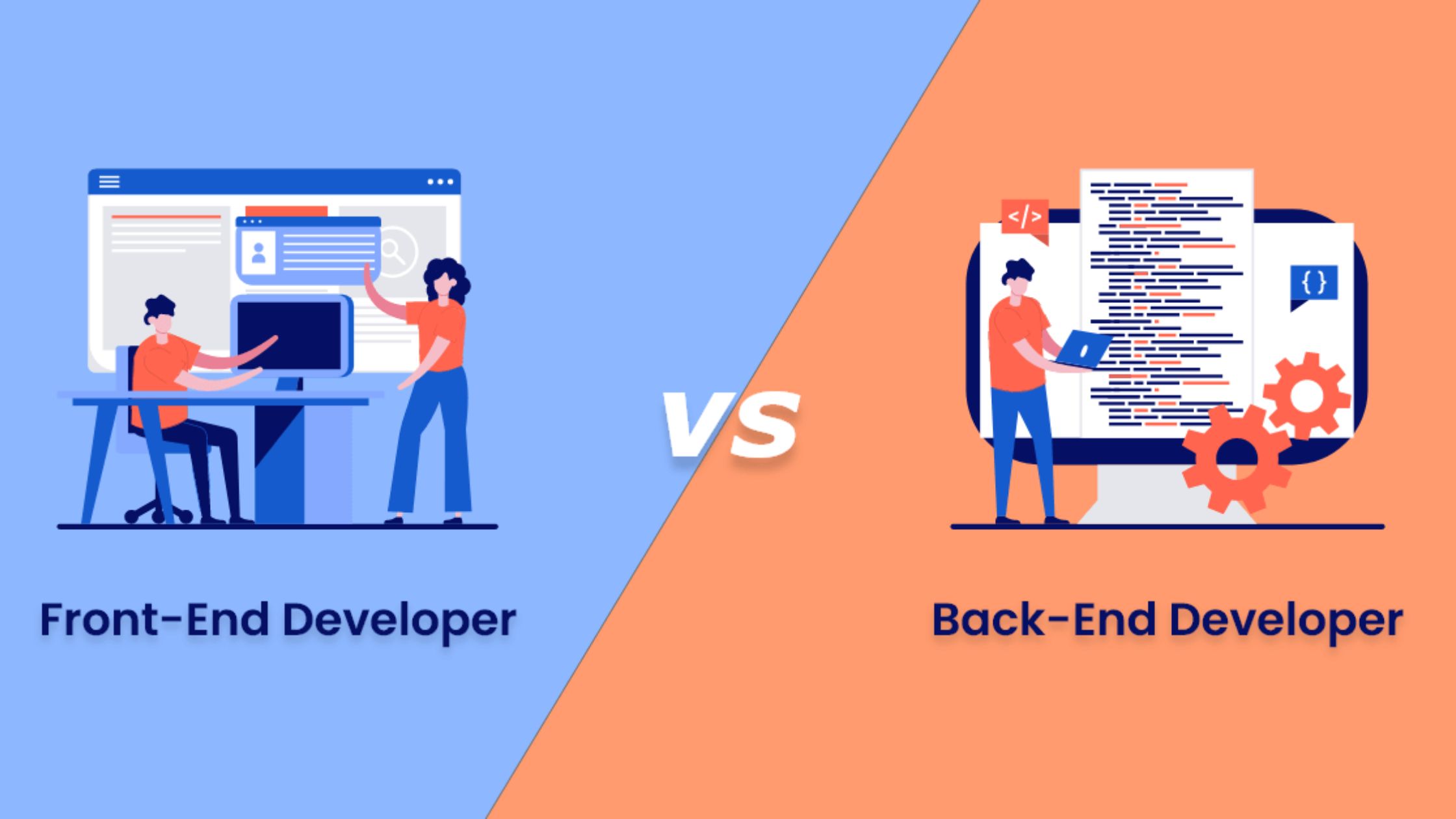In the dynamic realm of web development, two distinct roles play a pivotal part in creating the digital experiences we encounter daily: front-end developers and back-end developers. These tech maestros are responsible for crafting the seamless, interactive, visually appealing websites and applications we interact with. Let's delve into the fascinating world of frontend and backend development to understand the nuances that set them apart.
The Interface Maestro: Frontend Developer
What does a Frontend Developer do?
A front-end developer is akin to an artist, bringing life to the digital canvas users interact with. Their primary focus lies in creating the user interface (UI) and ensuring an optimal user experience (UX). HTML, CSS, and JavaScript are their tools of choice to mold static designs into dynamic and engaging web pages.
Key Responsibilities:
Implementing and styling web designs using HTML and CSS.
Crafting responsive and mobile-friendly layouts.
Enhancing user interactivity through JavaScript and front-end frameworks.
Tools of the Trade:
HTML
CSS/Sass
JavaScript
React, Angular, or Vue.js (Frontend frameworks)
Skills to Master:
UI/UX design principles
Responsive design
Cross-browser compatibility
The Architect of Logic: Backend Developer
Read More: World-Class Web and Mobile Apps Development Company in the USA
What does a Backend Developer do?
While front-end developers work on the visible elements, back-end developers operate behind the scenes, building the infrastructure that powers applications. They focus on server-side development, databases, and application logic, ensuring everything runs smoothly and efficiently.
Key Responsibilities:
Building server-side applications and APIs.
Managing databases and ensuring data integrity.
Implementing security measures to protect user data.
Tools of the Trade:
Server-side languages (e.g., Node.js, Python, Ruby, Java)
Database systems (e.g., MySQL, MongoDB, PostgreSQL)
RESTful APIs
Skills to Master:
Server-side scripting
Database management
Security Protocols
Bridging the Gap: Full-Stack Developers
While frontend and backend developers specialize in their respective domains, some developers embrace both worlds, earning the title of full-stack developers. Full-stack developers possess a comprehensive skill set, handling both client-side and server-side development. This versatility allows them to create end-to-end solutions and comprehend the entire development process.
Skills to Master:
Full-stack development frameworks (e.g., MEAN, MERN, Django)
Project management
Problem-solving
Collaboration is Key
In the collaborative dance of frontend and backend development, effective communication and teamwork are paramount. These professionals collaborate closely to ensure a harmonious fusion of aesthetics and functionality. Understanding the distinctions between frontend and backend development unveils the intricate layers behind the websites and applications we use daily, showcasing the synergy required to bring digital visions to life.
Whether you're drawn to the visual allure of frontend development or enticed by the logical intricacies of backend development, both roles contribute indispensably to the vibrant tapestry of the digital landscape. As technology continues to evolve, so do these roles, promising exciting opportunities for developers passionate about shaping the digital future. So, which side of the coding curtain calls to you? Frontend or backend? The choice is yours!
Frontend Developer vs Backend Developer: Key Differences
Front-end builders are accountable for efficiently enforcing visible additives on an internet site. They additionally carry out crucial internet site improvement responsibilities like navigation, buttons, or something that enables enhancing the website’s typical visibility. This is approximately ensuring the visible components of an internet site are functional.
Front-end developers and the front-end online course will help in building elements like buttons, forms, navigation, animations, graphics, etc. HTML, JavaScript, and CSS are frequently utilized for this purpose to ensure that your website functions well. Front-end developers must understand how the different sides of websites work to create a cohesive and easy-to-use product. They must have a strong working relationship with the backend devs who will help them with backend API which they essentially will consume to create a website or an application. The best way to start doing that would be these frontend development projects.
Who is a Back-end Developer?
Backend developers work on server-side development. They are accountable for constructing the shape of a software program application. Back-end devs deal with databases, server-side programming languages, and internet site architecture.
To make the server, application, and database sync with each other, backend developers use server-side languages like Python, Java, Go lang, etc. to construct an application and use databases like MySQL, and Oracle Postgres to find, save, or information and serve it again to the consumer through the front-end interface.
When a user makes a request to the device through the User Interface Framework, a developer must ensure that the software can supply any requested statistics or information. They also make sure that the internet site is scalable enough to survive high internet traffic when a huge number of users start using it.
Back-end developers also keep an eye on how the site functions and how to make modifications and updates behind the scenes.
Technologies Needed for Frontend Development
Here are important technologies that front-end developers deal with day in and day out.
HTML: HyperText Markup Language
CSS: Cascading Style Sheets
DOM: Document Object Model
JavaScript and JavaScript libraries and frameworks
HTTP: Hypertext Transfer Protocol
URL: Uniform Resource Locator
Front-end developers also use a set of frameworks and libraries and here are the two significant ones:
AngularJS
React.js
Technologies Needed for Back-end Development
Many languages and frameworks are used for back-end development. Here, we have provided the list of the same for a better understanding.
Python
Java
Golang
C#
C ++
Javascript
Node js
REST and SOAP
Databases
Writing high-quality unit tests is a must.
Understanding of session management in a distributed system’s context is required.
The backend developers also use certain frameworks:
Django
Spring
Express
Roles and Responsibilities of Front-end Developers
Here are the Roles and Responsibilities of Front-end Developers.
Defines additives on the web page with HTML.
Make websites appear alluring with CSS.
Works on interactivity with JavaScript.
Enhances the user experience by analyzing the user interaction on the web pages.
Choosing the structure and appearance of website pages.
Adding new features to improve the user experience.
They also assist in debugging apart from the overall look and feel of the UI interface.
They are also familiar with version control tools like git/svn, chrome developer tools, text editors, and IDE.
They write unit test cases to ensure their code behaves as intended with all the required parameters and cases.
Roles and Responsibilities of Back-end Developers
Here are the Roles and Responsibilities of Back-end developers
Working with front-end developers and other team members to set goals and design more functional and cohesive codes to improve the user experience.
By keeping an eye on industry developments and trends, and coming up with new ideas for new programs, goods, or features.
Concentrate solely on server-side coding and troubleshooting.
Create reusable code.
They are responsible for building or designing system architecture as well.
They build APIs that function on various underlying platforms.
Back-end Devs help in designing prototypes and frameworks.
They are also familiar with version control tools and are responsible for writing unit test cases to make sure no regression issues are found and their code is behaving as intended.
Conclusion
The difference between front-end and back-end developers is that they work on different aspects of the website. Front-end development is a type of programming that concentrates on the visual aspects of a website or app that a user will interact with. They are both important components of web development and are utilized to make websites useful and pleasant. If you are thinking about a career as a web developer but are not sure which part interests you then a full stack developer is a good option as they benefit from the best of both worlds.




Comments (0)